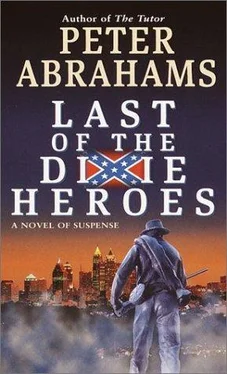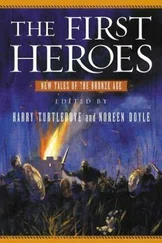Peter Abrahams - Last of the Dixie Heroes
Здесь есть возможность читать онлайн «Peter Abrahams - Last of the Dixie Heroes» весь текст электронной книги совершенно бесплатно (целиком полную версию без сокращений). В некоторых случаях можно слушать аудио, скачать через торрент в формате fb2 и присутствует краткое содержание. Жанр: Триллер, на английском языке. Описание произведения, (предисловие) а так же отзывы посетителей доступны на портале библиотеки ЛибКат.
- Название:Last of the Dixie Heroes
- Автор:
- Жанр:
- Год:неизвестен
- ISBN:нет данных
- Рейтинг книги:4 / 5. Голосов: 1
-
Избранное:Добавить в избранное
- Отзывы:
-
Ваша оценка:
- 80
- 1
- 2
- 3
- 4
- 5
Last of the Dixie Heroes: краткое содержание, описание и аннотация
Предлагаем к чтению аннотацию, описание, краткое содержание или предисловие (зависит от того, что написал сам автор книги «Last of the Dixie Heroes»). Если вы не нашли необходимую информацию о книге — напишите в комментариях, мы постараемся отыскать её.
Last of the Dixie Heroes — читать онлайн бесплатно полную книгу (весь текст) целиком
Ниже представлен текст книги, разбитый по страницам. Система сохранения места последней прочитанной страницы, позволяет с удобством читать онлайн бесплатно книгу «Last of the Dixie Heroes», без необходимости каждый раз заново искать на чём Вы остановились. Поставьте закладку, и сможете в любой момент перейти на страницу, на которой закончили чтение.
Интервал:
Закладка:
“About what?”
“Anything.”
“Just that they fired everybody. All he doesn’t understand is why he was the first to go.”
“Anything else?”
“Like what?”
Roy opened the leather-bound trunk. “My father died.”
“I’m sorry.”
Roy shrugged. “I got this.”
“Can I look?”
Roy didn’t see why not.
Lee bent over, started going through the trunk. “My God,” he said, straightening up, the uniform jacket in his hands. He went to the window, examined the threads, then pressed the jacket to his face, breathed in deeply.
“There’s more,” Roy said.
Lee went back to the trunk, pulled out the gun, Roy Singleton Hill’s gun with death carved on the wooden stock. He examined it from several angles, ran his fingers along the barrel, tested the hammer with his thumb.
“Is it a carbine?” Roy said.
“Oh, yes, one of the very best-a Sharps fifty-two-caliber breech-loading carbine made in eighteen fifty-nine, as it says right here.” Lee raised the gun in an easy, economical movement and took aim at something across the room; a pillow at the head of the bed-Marcia’s, actually.
“Will it still work?” Roy said.
“No reason why not. I can check it out for you, if you like.”
“Course there’d be no bullets,” Roy said.
“Bullets are easy to make.” Lee handed Roy the gun, started folding the jacket, paused. He felt in the pockets, turned the jacket upside down, gave it a gentle shake. Bullets fell out, eight or ten, landed on the sheets where Roy had been sleeping. They were smaller than Gordo’s bullet and not as completely oxidized, glinting dully here and there with lead. Lee cupped them in his hands, held them out for Roy like they were nuggets scooped from a stream.
“Let’s do some shooting,” he said.
Roy checked his watch. He didn’t see why not.
Mountain winterberries, picked yesterday: Roy in his Altima, the Sharps breechloader in the backseat, following Lee on the motorcycle, assumed they were on their way to one of the expressways out of town. But Lee went under the connector, turned up Northside, entered Buckhead.
Buckhead, but not Marcia’s Buckhead. This was the part Sunday drivers liked to tour, especially when they had visitors from out of town. The houses got bigger, but how much bigger was hard to tell because they were set farther and farther from the road. Lee rounded a bend, much too fast, Roy thought, disappeared from view. By the time Roy picked him up again, he was darting through gateposts a quarter of a mile ahead, leaning low.
Tall brick gateposts, Roy saw as he drove between them, joined by a brick arch. Two stone eagles stood side by side on top of the arch, one facing forward, one back. The lane Roy followed was brick as well, a long lane that took him past perfect lawns, blooming gardens, more lawn, a house that seemed low and massive, but was four stories tall in the central section, possibly with another half story above. Lee kept going, down a curving grade, past a pond with floating purple flowers, to a small brick house with purple shutters, a purple door, leaded windows, brass fittings.
“Welcome,” Lee said, coming to Roy’s car.
Roy got out. “This is your place?”
“This is my grandmother’s place, Roy. I live in the guest house.” Roy glanced toward the big house, mostly hidden by a grove of low trees. Roy could see shiny red berries clinging to the nearest branches. “Got the gun?” Lee said.
They went inside: books everywhere, on floor-to-ceiling shelves, on tables, chairs, the floor. On the spines and jackets Roy saw the same images-muskets, cannons, flags-read the same words- blue, gray, Lincoln, Davis, Grant, Jackson, war.
Lee took the gun into the kitchen, laid it on the table beside a vase of purple and yellow flowers; a fine crystal vase-Roy remembered Marcia admiring a similar one in a store window. “Know much about small arms?” Lee said.
“Nothing.”
Lee knelt, peered down the barrel. “No rust at all-it must have been practically soaked in oil. Whale oil being what they used back then. First, you pull the hammer back to half-cocked. Then bring the lever down like this. Rotate the pin, pushing down this little button. And the whole breech block slides out just like so.” Lee held up the breech block. “These are the vent holes-it’s all about controlling rapidly expanding gas.” He dug a toothpick into two tiny holes in the breech block. “Like it was cleaned yesterday.” Lee put the gun back together, found linseed oil under the sink, rubbed it into the stock and grip. He went still. “Don’t laugh at me if I tell you this.”
“What?” Roy said.
“It feels like something coming alive in my hands.”
Roy didn’t laugh.
Lee laid the bullets on the table. “No cartridges,” he said, “meaning these were probably picked up off the ground. I doubt cartridges would have fired anyway, after all this time. Instead-” He left the room, returned with a small plastic tube, a brass cylinder, and a red can with Globax on the label.
“Not wearing synthetics, are you, Roy? Static electricity can be a problem with this stuff.”
“I know,” Roy said.
Lee glanced at Roy, then at the label. He turned the can so the word was out of sight and held up the brass cylinder, as though distracting a child with something shiny.
“Adjustable powder measure,” he said, twisting a screw in its base. “A fifty-two caliber takes sixty grains, but we’ll shoot straighter with fifty.” He poured powder into the plastic tube. “No plastic tubes back then, of course, but they do work well with these ring tails.” He stuck one of the bullets in the top of the tube, opened the breech, jammed the tube right into the barrel, leaving the bullet and powder inside. “As for caps, musket ones will do.” He stuck a tiny hemisphere of copper onto a nipple under the hammer, then closed the lever with a snap. The sound itself was satisfying.
They went behind the house. It was very quiet, not like being in the city at all. Ahead lay a long, narrow stretch of lawn, not much wider than a country lane, with a line of trees on one side and a high brick wall on the other. “There were riding trails in here when my grandmother was young,” Lee said. He raised the gun, aimed at a low wooden fence-a riding jump, Roy saw-in a sunny patch a hundred yards or more down the grassy lane. Glass bottles glinted on top of the fence.
Lee lowered the gun. “You first,” he said, handing it to Roy.
“I’ve never fired a gun,” Roy said.
“Then this is even more special,” Lee said. “Hold it like so.” Roy held it like so. “Look through that V with your right eye.” Roy looked through the V with his right eye. Coke bottles, seven of them. The middle one was framed in the V. “Pull the hammer back all the way, Roy. Now squeeze like you want just a little toothpaste, but all at once.” Roy squeezed the way Lee said. He heard a bang, felt the kick of the gun, much stronger than he’d anticipated, strong enough to hurt, saw a puff of blue-gray smoke, smelled burned chemicals-nitrates, a smell he knew.
Lee put on his glasses. “My God,” he said.
The middle Coke bottle was gone.
“Beginner’s luck,” Roy said.
Lee took the gun, reloaded it, handed it back to Roy. “Don’t you want a turn?” Roy said.
“I’d rather watch y- I can wait.”
Roy raised the gun, got the Coke bottle on the left end into the V, squeezed the way Lee had told him. Bang-another satisfying sound; kick-a kick he was more prepared for this time, a lively kick, he thought; puff: and the Coke bottle on the left end was gone.
“You lied to me,” Lee said.
“About what?”
“Never firing a gun before.”
Читать дальшеИнтервал:
Закладка:
Похожие книги на «Last of the Dixie Heroes»
Представляем Вашему вниманию похожие книги на «Last of the Dixie Heroes» списком для выбора. Мы отобрали схожую по названию и смыслу литературу в надежде предоставить читателям больше вариантов отыскать новые, интересные, ещё непрочитанные произведения.
Обсуждение, отзывы о книге «Last of the Dixie Heroes» и просто собственные мнения читателей. Оставьте ваши комментарии, напишите, что Вы думаете о произведении, его смысле или главных героях. Укажите что конкретно понравилось, а что нет, и почему Вы так считаете.












